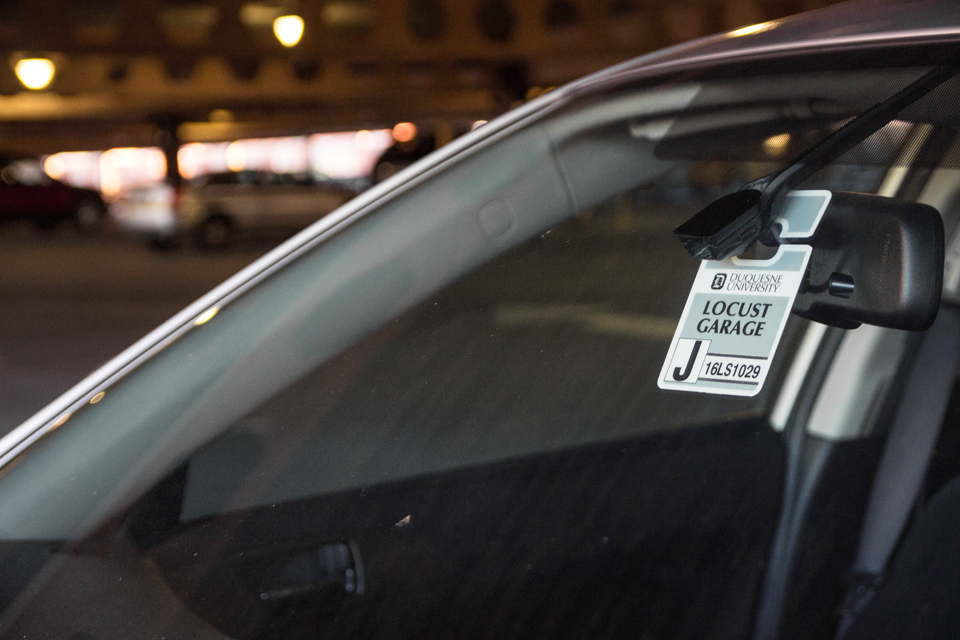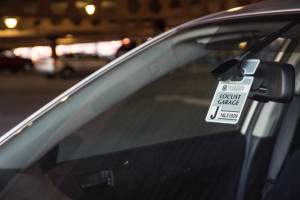

A parking permit hangs in the window of a car on campus. Commuters’ parking permits carry more restrictions than those of their resident classmates.
By Casey Chafin | The Duquesne Duke
After receiving hundreds of dollars in fines for parking on campus between 2 a.m. and 5 a.m., Duquesne commuter students are awaiting a response from the Office of Parking and Traffic Management about whether or not they will receive the same parking permissions as resident students.
This semester, the parking office and Duquesne Police began enforcing a rule that prohibits students with commuter parking passes from parking on campus between 2 a.m. and 5 a.m.
Scott Richards, executive director of Auxiliary Services for Duquesne, said, “The policy has been in place for many years and has been unsystematically enforced. This year the decision was made to be consistent in enforcing it.”
“What I just don’t understand is, why can’t I park overnight?” said Emily Pollock, 20, psychology major. “Because it’s not like there’s more people there overnight. There’s probably less people parked there overnight. It’s not like I’m taking up spots for people who are strictly parking overnight.”
Parking passes for commuters cost the same as resident parking passes, according to Richards. Student garage parking passes cost $1,172 for an annual permit, $758 for an academic school-year permit, and $426 for a semester permit.
There are many reasons why a student living off campus may need to stay overnight, according to Pollock.
Commuters who choose to park their cars on campus overnight risk receiving a $25 ticket for the first offense, and $50 for every subsequent offense.
Miller Goughneour, president of Duquesne Commuter Council, said he has already received a fine this semester for parking past the authorized hours. Although he lives off campus, he occasionally likes to stay late on his fraternity’s wing in Towers.
“I feel like one of the biggest problems was the way the parking department went about distributing the information, [not] letting commuter students know that this is a rule, that this is going to be enforced,” Goughneour said. “There are still students on campus that I’m sure do not know about this policy.”
Justin Morden, vice president of Commuter Council, agreed that students who purchased the parking passes were not made aware of the rule.
“The policy was not even stated on any of the forms the commuters signed this summer when buying their parking passes,” Morden said, “although this has been changed in the newer forms.”
Compared side-by-side, the old form makes no mention of any disparity between commuter passes and resident passes, but in the new form, available on the Duquesne website, several new lines are added which read, “No commuter permit holder is permitted to park any vehicle on Duquesne University property between the hours of 2:00 a.m. through 5:00 a.m.”
According to Morden, the old applications were in until August.
Goughneour said the Commuter Council met with Richards and Denise Iuzzolino from the parking office last week, and the council was able to voice the concerns of the more than 20 students who sent in emails about the policy.
Morden said several complaints the council received include nursing majors who work overnight at hospitals, and students who work late shifts as desk aides or in the Campus Market.
Pollock said if commuters are not allowed to park overnight, the university should lower the price of commuter parking passes.
Morden agreed, saying it is only fair that Duquesne at least refunds the commuters for the time the students cannot park there, which is 12.5 percent less than resident students.
“The biggest question commuters are asking us and the parking office is, why are we paying the same amount as residents for a parking pass when we have fewer parking privileges?” he said.
Pollock said the problem also goes beyond money, and is a matter of student safety.
“I don’t want to make this sound like it’s just about drinking, but that’s a huge thing,” she said. “Because if you’re 21, it’s a weekend, you’re drinking with your friends, you can’t be parked here overnight. So does Duquesne want you to drive home?”
Goughneour said Parking and Traffic Management “seemed receptive” during their meeting, and Commuter Council is waiting to hear back on what will happen moving forward.





There seems to be the misunderstanding that Parking is behind the rule enforcement. As I understand it, Parking was instructed to enforce the rule by an upper level administrator, whose name they refused to reveal. In my experience, this seems to be typical lack of transparency on the part of Duquesne. As I am sure those reading this forum and those having read the Duke can tell, there are plenty of solid reasons pertaining to student safety, student academic progress and success, and student extra-curricular activities why students protesting this rule might reasonably demand that this policy be changed. As I see it, there is no reason for the student body to back down on this issue. I firmly believe we are in the right for demanding that the administration address this problematic parking policy.
I know I personally have faced the decision of going to the hospital or not in response to mental health issues derived from my disability (for which I do receive ADA accommodations). Parking is a significant concern for individuals who go to the ER for mental health reasons. Going to the ER for mental health reasons can result in hospitalization fairly easily, and hospitalization, even with health insurance, is fairly expensive. This can especially be the case for people like me who have little social and economic support and an expensive Liberal Arts degree that has not, thus far, been helpful in obtaining a steady job to pay back the loans. The cost of a parking fine on top of the cost of an ER has definitely removed going to the ER as an option for me in situations when I am on campus and am struggling with my mental health disability. Alexis, who also posted here, reports that Parking downgraded her ticket to a Warning when s/he had to go to the ER. But, I ask myself whether this is something that I could depend on the Parking office to do if I needed to go to the ER. I am also asking myself exactly what the Parking Office might be “warning” a student of if they were to give me or anyone else a warning for parking in the garage at a certain time after having to go to the ER. Would this be a warning not to get sick? Would this be a warning not to go to the ER if one needs to, even if it the consequences could result in serious injury or death? What would they be warning a student of when a student makes the responsible decision to seek necessary medical help? When I emailed parking about my concerns that I believe this rule discourages students from going to the ER and puts at a disadvantage students wanting to use the library’s final exam hours and asked that they forward the email to the administrator responsible for this policy, they emailed back stating that they “empathize with my situation,” and they offered me a refund. I have not seen any indication that they bothered to forward my concerns to the administrator responsible for the policy. Refunding my permit still would not help me to get to the ER from campus when I need to, it would only make the parking situation more difficult.
I am aware that there are a number of groups of students looking to fight this policy, but I think there is still too much dispersion and not enough concentrated effort to effectively fight this. I suggest to anyone reading this that we gather together all of the representative student body groups to fight this. I suggest that the Commuter Student Organization (CSO) should take the lead but that other student organizations should stand publicly and firmly behind the CSO, assisting them with supporting documentation of their own. I encourage Duke staff to publish follow-up articles on this issue. The Duke did an excellent job bringing to light the poor working conditions of adjunct instructors at the same time as making known, what I believe to be, the obscene amount income that our former president was receiving off the backs of our heavily debt-ridden student population. And, I believe the Duke showing concern for its fellow students can be instrumental here. Additionally, if there are any students in the Pre-Law program reading this who can contribute suggestions regarding potential legal remedies, this would also assist the student cause.
Not too long ago, I had a medical emergency and had to leave my car in Forbes garage overnight while I was in the hospital. When I retrieved my car the following day, I saw that I had a $50 fine and it was only my first offense, ever. I went to the parking office and spoke with some awesome staff and explained the situation. They were able to put it down to a warning and dismiss the fine, but I still wish there was a little bit more leniency or information.
My question would be when finals come around and Gumberg has late night study sessions, will commuters have to park on the street? I feel safer in the garage, especially at 2 in the morning.
All I have to say is to be patient and be kind to our parking management staff workers as all of the kinks are worked out.
WOW doesn’t surprise me Duquesne loves to enforce any rule that they can make money off of people, especially commuters! even commuter “meal plans” cost more than it would be to buy the meals out of pocket. It’s ridiculous.
The drinking aspect is something that strongly needs to be considered!!! this is such an unsafe and unfair rule!
In addition to the reasons as to why this rule is ridiculous already voiced by the Duke and by others on this comment page, I would like to add two more: 1) many commuter students rely on the extended, overnight hours in the library during final exams to study, write papers, and have some place constructive to go when dealing late-night finals stress. This no parking overnight rule, I believe, shows disregard on the part of administrators, for the academic success and mental stability of commuter students who need the library at those times. It also, I believe, favors the academic progress of residential students over commuter students. Additionally, 2) sometimes students have to go straight from Duquesne to the Mercy ER next door. I believe that this overnight rule discourages students from going to the ER when they might need it for fear of being at the hospital during the time the garage is closed to students. In this way, I feel that University administrators discourage students from going to the ER when they need it, which, I believe, poses a student safety risk.
Many Student-athletes live off campus and travel to away games and competitions. They are representing Duquesne but will get fined for parking over night while away? Not to mention they have already spent a fortune on these parking passes. Do staff members get fined as well? Coaches also leave their cars parked over night on campus when traveling to away competitions.
It’s all about money. Always is with Duquesne. Collecting it…not giving it.
what about commuter student athletes? or if you go on a mission trip? this rule is dumb